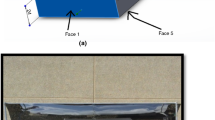Abstract
Salt gradient solar pond has thermal performance parameters as rate of warm-up, highest achievable temperature, and cumulative heat collection. All these are strongly influenced by the meteorology. Consequently, specific to the meteorology of a geographic location, there is a best starting day for the as pond defined by Singh et al. [1]. The present work has done rigorous analysis of influence of meteorology on pond’s thermal performance. It is found that the starting day has strong influence in initial stage of pond warm-up; however the effect diminishes in long-term. Finally pond started on any day of the year acquires same highest temperature. It is also found that in order to retrieve maximum heat, waiting for the best starting day to commission a pond is not judicious, rather it is always more beneficial commission the pond at the earliest possible day. This finding is of practical significance while planning to put a pond in operation.
Similar content being viewed by others
References
Singh, T.P., Singh, A.K., and Kaushika, N.D., Heat Recovery Syst. CHP, 1994, vol. 14, no. 4, pp. 401–407.
Weinberger, H., Solar Energy, 1964, vol. 8, pp. 45–46.
Tybout, R.A., Solar Energy, 1966, vol. 11, pp. 109–111.
Hull, J.R., Solar Energy, 1980, vol. 25, pp. 33–40.
Winberg, S., Sunworld, 1981, vol. 5, pp. 122–125.
Amnon Einav, Solar Energy Eng., 2004, vol. 126, no. 3, pp. 921–928.
Al-Dabbas, M.A., Appl. Solar Energy, 2011, vol. 41, no. 1, pp. 14–23.
Hull, J.R., Solar Energy, 1980, vol. 25, no. 4, pp. 317–325.
Njoku, H.O. and Ekechukwu, O.V., Appl. Solar Energy, 2011, vol. 47, no. 3, pp. 213–220.
Sukhatme, S.P., Solar Energy-Principles of Thermal Storage and Collection, New Dehli: Tata McGraw Hill Publ., 1994.
Husain, M., Patil, S.R., Patil, P.S., and Samdarshi, S.K., Solar Energy, 2003, vol. 74, pp. 429–436.
Kooi, C.F., Solar Energy, 1979, vol. 25, pp. 37–45.
Kooi, C.F., Solar Energy, 1981, vol. 31, pp. 113–120.
Duffie, J.A. and Beckman, W.A., Solar Engineering of Thermal Processes, John Wiley, 1981, pp. 78–80.
Gerald, F.C. and Wheatley, P.O., Applied Numerical Analysis, Addison Wesley, 1990.
Bryant, H.C. and Colbeck, I., Solar Energy, 1977, vol. 19, pp. 321–322.
Mani, A. and Rangrajan, S., Solar Radiation over India, Allied Publ. Private, 1982.
Hull, J.R., Liu, K.V., Sha, W.T., et al., Solar Energy, 1984, vol. 33, pp. 661–666.
Prasad, R. and Rao, D.P., Solar Energy, 1993, vol. 50, no. 2, pp. 135–144.
Husain, M., Patil, P.S., Patil, S.R., and Samdarshi, S.K., Renew. Energy, 2002, vol. 28, pp. 767–801.
Robert, H.P. and Green, D.W., Perry’s Chemical Engineers’, New York: McGraw Hills, 2007.
Author information
Authors and Affiliations
Additional information
The article is published in the original.
About this article
Cite this article
Husain, H., Shekhawat, S. & Husain, M. Meteorologically efficient commissioning of salt gradient solar pond. Appl. Sol. Energy 48, 180–185 (2012). https://doi.org/10.3103/S0003701X12030061
Received:
Published:
Issue Date:
DOI: https://doi.org/10.3103/S0003701X12030061




